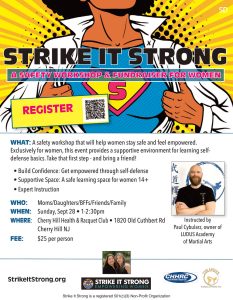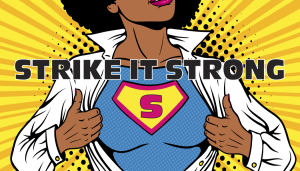
Self-defense safety class and fundraiser for women on Sept. 28 in Cherry Hill NJ
Women ages 14 to 104 are invited to learn the basics to protect themselves in sticky situations What started as two friends wanting to do something meaningful for the community, Strike It Strong has grown into a nonprofit with a mission to help and empower women through self-defense classes and wellness seminars. Mark your calendars for Sunday, Sept. 28 from 1 to 2:30 pm, because Strike It Strong hosts its next event at the Cherry Hill Health and Racquet Club.










